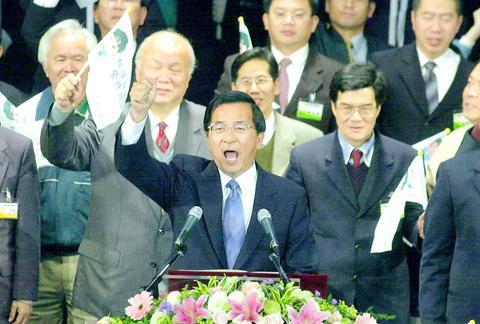The Democratic Progressive Party (DPP) held a national congress yesterday to endorse the party's presidential campaign ticket featuring President Chen Shui-bian (陳水扁) and Vice President Annette Lu (呂秀蓮).
Addressing the convention, staged as a gala-like campaign event, Chen raised three questions he would like to put to Chinese President Hu Jintao (胡錦濤):
? Why can't Taiwan and China go their separate ways since they have antithetical political systems?

PHOTO: CHIANG YING-YING, TAIPEI TIMES
? Why can't China dismantle its missiles used to intimidate democratic Taiwan?
? And why can't Taiwan enter the World Health Organization?
"If the Beijing authorities can't provide answers to these questions, I believe the people of Taiwan will give their own answers on March 20," Chen said, reiterating his stance to hold a "defensive referendum" on the same day as the election.
Chen said that it was not his desire to hold a referendum which was the destabilizing factor in the region, but China's attempts to intimidate Taiwan, its missile build up and its refusal to renounce the use of force.
"It is China's military threat that would change the cross-strait status quo, not Taiwan's democratic practice of holding a referendum."
Chen stressed that the referendum was not intended to be provocative, but to safeguard Taiwan's security and that it would certainly not be cancelled as a result of threats by China.
"No matter how hegemonic China is and how much pressure Taiwan faces from such a power, Taiwan must insist on following the path of democracy," Chen said.
Speaking in his capacity as the DPP's flag-bearer, Chen yesterday also pledged to conduct a "fair, positive, and quality" campaign.
He also said he was willing to reconcile with the opposition parties, after a long period of inter-party feuding, for the sake of political harmony after the election.
"It is foreseeable that after the election next year, the domestic political situation is bound to have a new look due to the reintegration of party elements. The DPP is willing to attempt reconciliation with supporters of all political stripes to allay the negative effects of election feuding," Chen said.
The DPP's national congress yesterday also honored a total of 626 senior party members for their contribution to the process of Taiwan's democratization.
To gear up full support for Chen's re-election, seven counties and municipalities yesterday convened a campaign meeting prior to the national congress, with each administrative unit pledging to increase the DPP's total vote by 10 percentage points compared with the 2000 presidential election.
In Chiayi County yesterday, former President Lee Teng-hui (李登輝) extended his support for Chen's reelection bid and vowed to mobilize one million people on Feb. 28 for an island-wide rally.
Lee made the comments at the establishment of the Taiwan Solidarity Union's (TSU) Chiayi County Chapter. Lee founded the TSU in 2001, which has since become a strategic partner of the DPP.
Later yesterday the DPP staged a 100,000-people rally in Taipei County's Erchung Waterfront Park.
Chen and Lu, as well as the DPP's five major campaign leaders -- Premier Yu Shyi-kun, Presidential Secretary General Chiou I-jen (邱義仁), Taipei County Magistrate Su Chen-chang (蘇貞昌), Kaohsiung City Mayor Frank Hsieh (謝長廷) and DPP Secretary General Chang Chun-hsiung (張俊雄) -- all attended the rally.
Also See Stories:
Taiwanese shouldn't be pessimistic: Lu
Strong personality the making of Lu

Taiwan yesterday denied Chinese allegations that its military was behind a cyberattack on a technology company in Guangzhou, after city authorities issued warrants for 20 suspects. The Guangzhou Municipal Public Security Bureau earlier yesterday issued warrants for 20 people it identified as members of the Information, Communications and Electronic Force Command (ICEFCOM). The bureau alleged they were behind a May 20 cyberattack targeting the backend system of a self-service facility at the company. “ICEFCOM, under Taiwan’s ruling Democratic Progressive Party, directed the illegal attack,” the warrant says. The bureau placed a bounty of 10,000 yuan (US$1,392) on each of the 20 people named in

The High Court yesterday found a New Taipei City woman guilty of charges related to helping Beijing secure surrender agreements from military service members. Lee Huei-hsin (李慧馨) was sentenced to six years and eight months in prison for breaching the National Security Act (國家安全法), making illegal compacts with government employees and bribery, the court said. The verdict is final. Lee, the manager of a temple in the city’s Lujhou District (蘆洲), was accused of arranging for eight service members to make surrender pledges to the Chinese People’s Liberation Army in exchange for money, the court said. The pledges, which required them to provide identification

Nine retired generals from Taiwan, Japan and the US have been invited to participate in a tabletop exercise hosted by the Taipei School of Economics and Political Science Foundation tomorrow and Wednesday that simulates a potential Chinese invasion of Taiwan in 2030, the foundation said yesterday. The five retired Taiwanese generals would include retired admiral Lee Hsi-min (李喜明), joined by retired US Navy admiral Michael Mullen and former chief of staff of the Japan Self-Defense Forces general Shigeru Iwasaki, it said. The simulation aims to offer strategic insights into regional security and peace in the Taiwan Strait, it added. Foundation chair Huang Huang-hsiung

’DISTORTION’: Beijing’s assertion that the US agreed with its position on Taiwan is a recurring tactic it uses to falsely reinforce its sovereignty claims, MOFA said The Ministry of Foreign Affairs (MOFA) yesterday said Chinese state media deliberately distorted Taiwan’s sovereign status, following reports that US President Donald Trump agreed to uphold the “one China” policy in a phone call with Chinese President Xi Jinping (習近平). During the more than one-hour-long call, Xi urged Trump to retreat from trade measures that roiled the global economy and cautioned him against threatening steps on Taiwan, a Chinese government summary of the call said. China’s official Xinhua news agency quoted Xi as saying that the US should handle the Taiwan issue cautiously and avoid the two countries being drawn into dangerous